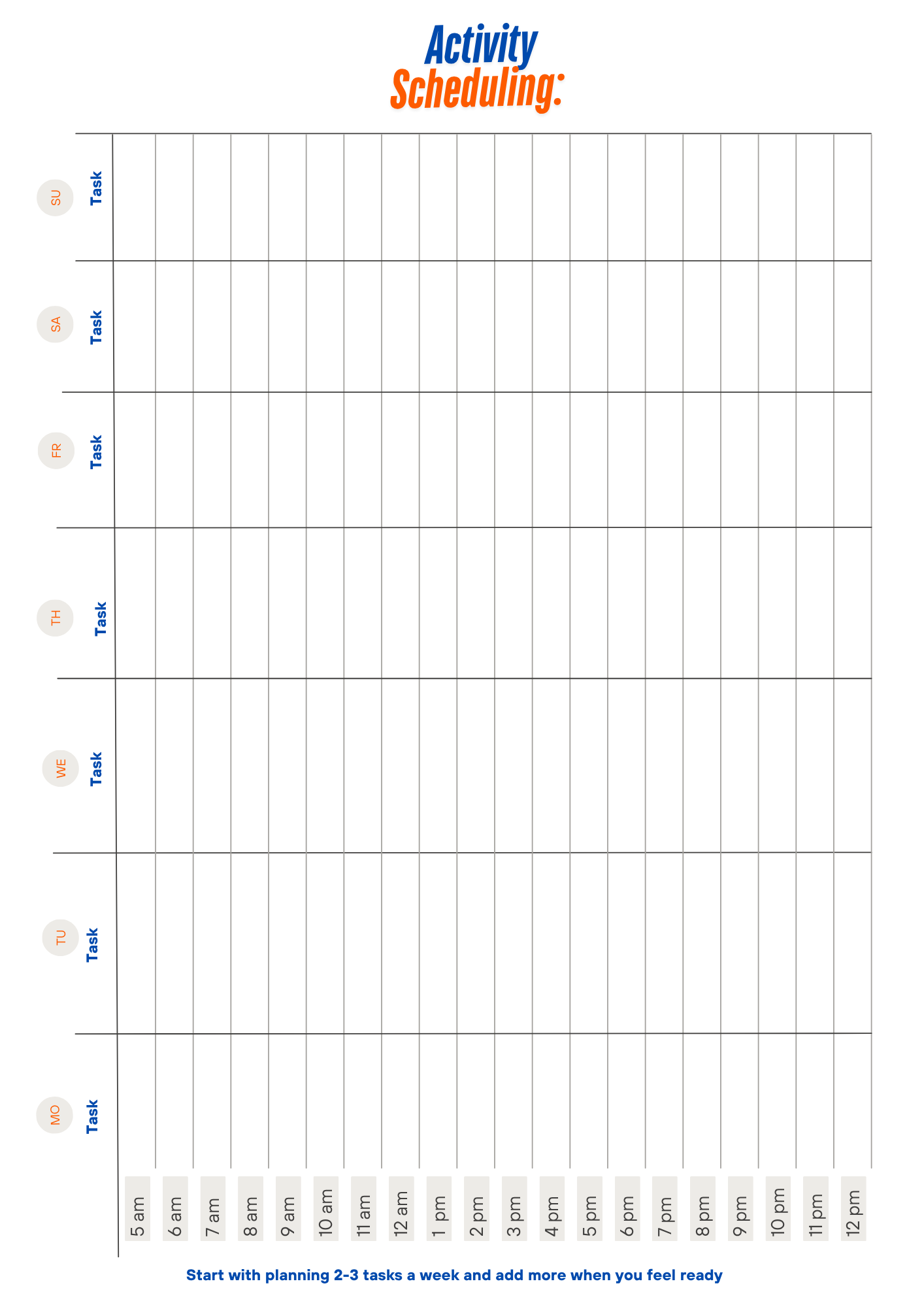Free Depression Self Help - Part 3: Activity Scheduling
Learn how to overcome depression at home - Part 3:
This series is dedicated to helping you understand what depression is and how to overcome it without the need for therapy.
Content Page:
This guide is split into 4 parts. Each with a video, worksheets and tasks.
Part 3: Activity Scheduling:
Part 3 of this series is about how to overcome Avoidance Patterns to have a more meaningful life. We can do this by intentionally doing activities which increase the rewards we get out of life and reduce our stressors.
In theory this is easy, however, as anyone with depression can tell you, its hard to get motivated and follow through. This is where “Activity Scheduling” comes in.
Watch the video below to understand how to use Activity Scheduling.
Part 3 - Activity Scheduling:
Once you have watched the video you should have a good understanding of why and how we can plan activities to overcome our Avoidance Patterns.
Using the information you gathered from your “Activity Monitoring”. Find out what activities gave you the lowest pleasure, achievement or mood ratings. Try replacing these with more valued activities which will improve your mood.
Focus on four things:
1) Build in activities that increase the rewards in your life - The things that give you pleasure, achievement or social connection.
2) Replace “low value activities” with more meaningful ones - The things that gave low pleasure, achievement and mood ratings or a lack of social connection.
3) Add in activities that overcome or reduce the stressors in your life - For example, doing the housework so you are not living in a mess or try to solve life problems like debt.
4) If you notice you use an Avoidance Patterns, plan in what else you can do instead - For example, if you notice you aways cancel plans with friends, why not plan in more activities with them doing activities you enjoy.
For the next week or two try planning things in.
Click on the image to download the worksheet.
Tips on how to plan effectively:
A few a week: Start with just a few activities. You don't need to plan every moment of your day.
Make a Concrete Plan: Having a concrete plan is more likely to succeed. Use the four W’s - "what, when, where, and who". These help the plan become more specific and more likely to happen. Avoid any vague words you can use to wiggle out of the activity such as "soon", "at some point" or "later".
Easiest to hardest: Start with easy tasks and build up to harder ones.
Don't only plan in pleasurable activities: Don’t only focus on things that will increase your pleasure scores. Things that give us a sense of achievement or reduce our stressors are equally important. These can be the routine or necessary day to day things that you need to do. Doing routine and necessary activities are important for your long-term mental health, even if you don't enjoy them. For example, not many people actually enjoy brushing their teeth , but it is still important for our long-term health, so we do it.
Timed: It can be useful to set yourself a minimum time for the activity you plan in. This should be shorter than the activity actually needs. This helps you get a sense of achievement even if you do not manage to fully complete your task. It is about starting, not always finishing. For example, plan in a minimum of 5 minutes to hoover a room. Anything over that time is a bonus.
Spread out activities: Do not plan everything too close together. Give yourself breaks. You also do not need to plan every moment of every day. Just add a few activities a week to start.
You are in control: Go at the speed that suits you. Aim to push yourself a little bit but be aware of what is realistic.
Try this out for a week or two before moving onto the next video - Practice is more important than just rushing through the course.
During this time. Do your best to listen to the plan you have made, not how you are feeling on the day. Remember the words “follow your plan, not your mood” whenever you feel unmotivated.
Up Next: Part 4 - TRAP and TRAC:
Now you understand how planning in activities can boost your mood. The next video will be on what to do if Depression tries to fight back.
Need more help:
If you need more help after the free course, I have written a detailed step by step on how to use this strategy as well as others to overcome depression.
I recommend the paperback version over the e-book as it gives you access to all the worksheets you will need.
Click on the image to go to Amazon.
Or book in a session with myself to really get to the core of your depression and we can overcome it together.





